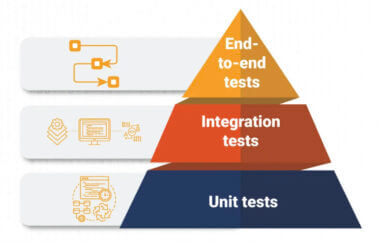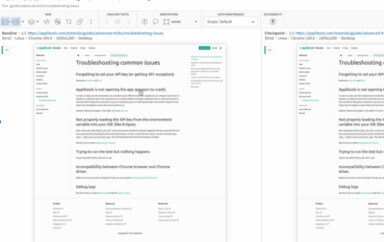Management is a topic we come across in various manners throughout our careers. Whether it’s an aspiration one has to reach in their career, working with managers, or via a course. Management is defined as the following “A manager is an individual within an organization who is in charge of coordinating the efforts of individuals or the allocation of resources. As such, a manager is one who undertakes management activities”.
ICYMI: Watch the on-demand recording of Skills and Strategies for New Test Managers.
There is no template to follow for becoming an effective manager. Everyone has their own traits, some learn on the job, some look up to their managers and some may even be born as natural managers. In this blog, I will share with you some gems and tips of skills and strategies new Test Managers could envisage and find greater success.
In the UK alone, there are 2.4 million employed full-time managers, directors, and senior officials.
Statista
Where to start from?
If you are a new manager or willing to be promoted to a managerial role, you could start from the following options:
- Research the role fully and understand what your deliverables, career progression, and path look like.
- Look for some management training internally/externally to see if this is the right “future” role for you.
- Speak to existing managers and see what their thoughts are, where did they start from, and if they have any tips or if you could shadow them with a task or two.
- Attend talks/listen to podcasts from existing managers and see if you like the sound of the role.
The above steps could help you land on your dream job.
“There are over 1,583,412 managers currently employed in the United States. 49.0% of all managers are women, while 51.0% are men. The average age of an employed manager is 44 years old.”
Zippia
Furthermore, something to be more involved with could be understanding and establishing a leadership philosophy within your practise and seeing what the future of this practise is. Focusing on the day to day of management and leadership in your current role/remit is also a starting point. Be clear about your communication and top priorities as this will also help you engage better as a manager. Setting common values and common standards will also add to your role and the most important thing, IT IS OK TO BE SCARED/VULNERABLE or even go through Imposter Syndrome. Every manager I have come across is not perfect. There is no such thing as a perfect manager. However, a manager must not only focus on technical deliveries but also be a people’s person first and foremost. It’s all about the team and with the team you make the dream work successfully and confidently.

Traits to adopt
Be a good coach because this role is not just about excelling and delivering, but also coaching those who would work with you or aspire to have a similar role in the near future. Coaching is so beautiful. It’s amazing how we can ask open-ended questions and untangle individuals to reach their answers in a quicker manner.
Express interest/concern for team members’ success and personal well-being, because it’s about your team. It’s vital to celebrate your team as well as focus on their well-being. We work day in and day out, sometimes we forget to take a break. Sometimes I have my team members come up to me asking me if there is any other piece of work, I just tell them “use this time for self-learning, relax, and enjoy this free time”. Something as simple as this brings a smile on their faces. The world is changing, and I feel we should move with it. Never fall into the trap of micro-management. Trust, value, and celebrate your team.
Aim for a productive and results-orientated managerial way of working. This will help you showcase your teams, your work, and your ways of working. Serve as an example. Sometimes we delve into deliverables too much and have no time to showcase any of the results we achieve. To get good results, we also need to work on a process/strategy to get us what we are aiming to reap.
Empower the team and do not micromanage. I think this is self-explanatory. If you empower your team, it’s very common to see the results you all want to see whether that’s winning more projects to test, great testing feedback, or your WoW being commendable. Micromanaging doesn’t get us anywhere but at the doorstep of HR. Whereas being sociable as a manager gives your organization a friendly face, making employees feel more secure at work. Happy members of staff work harder, and are less likely to produce substandard results because they are just trying to get through the day.
Be a good communicator and listen and share the right information. When you come to know something vital for your team, make sure to communicate and involve them. Allow them to also express their thoughts. Differences in every team exist, but you call that a great team. Not everyone has to have to think in the same manner, which might help trigger an important issue no one else could think of. Also, listening to everyone, making time for this task is another super important trait. It’s not always about doing but also listening.
Just like you became a manager, your team would also have career aspirations, therefore help the team with their objectives and career development with the right training paths, learnings, and experiences.
As I mentioned earlier there is no perfect/right type of manager. It’s all about your learnings, skillset, and expertise to excel within this role. You can obviously adapt the above and excel more.
The importance of being a People Manager
“This position allows you to ‘sense’ every member of the team as well as the shape of the team itself. Sensing all members refers to the first statement above, getting to know your team members, listening to them, understanding who they are, how they feel, how they fulfill their part of the work within the team.”
Jean-Philippe Grenet
Effective people management can improve morale and employee engagement, reduce turnover, and enhance communication throughout teams. Furthermore, being there for your team means you can optimise productivity, engage employees, and develop a culture of innovation.
A good leader gets to know their team and makes time for them, whether that’s for some feedback, general chat, or even a serious topic. When an employee is going through something in their personal or professional life, extending empathy and compassion is a very ensuring act from a manager. It helps bring focus and value within a team.
Remember also to give and receive feedback. As a leader, your team is working with you to support the mindset and quality delivery you and the entire team have planned and had an input in. Feedback is expected and is an excellent way to revert back to members on how they are doing. Sometimes feedback can be a little difficult to deliver if it’s not all positive, but which team is 24/7 and every year working as a star team? Perhaps, choose a different place other than the office to speak to a team member and provide them with some guidelines, support, and time. On the other hand remember to take feedback too, on how your team feels you are working with them. It’s a two-way process.
Therefore, being there for your team would lead to effective people management and can help boost employee retention, employee engagement, and organisational effectiveness.
Conclusion
A manager in my eyes is one who not only focuses and is responsible about test best practices, but leads with a technical mindset too. A good manager’s door will always be open regardless of how busy he/she is. Also being sociable as a manager gives your org a friendly face and makes employees feel more secure. Do not forget to empathize and be a compassionate lead as this helps the team’s well-being too and in turn, there is respect and transparency. Finally, aim for a collaborative and holistic working approach as that would not only help your team grow but also serve as a great example.
Be sure to follow my social channels:






